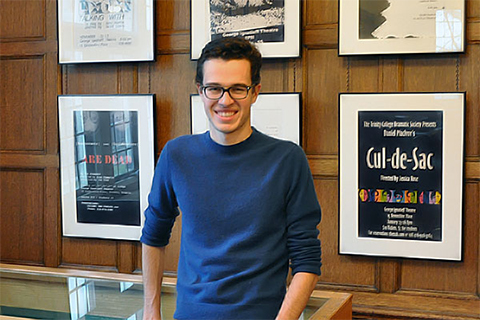
Connor Emdin, a fourth-year Trinity College student, co-founded Salt for Survival, a student-run fundraising organization for salt iodization programs. He’s written articles for Juxtaposition and the Varsity. He’s a peer counsellor for biochemistry and applicant assessor at Trinity College. He volunteers at Mount Sinai Hospital, working with Dr. Paul Walfish in the endocrinology department. In his free time, he is a marathon runner. He spoke recently with Jessica Lewis of the Faculty of Arts and Science
What’s it like to win a Rhodes scholarship?
Extremely humbling. I’m in amazing company, including my fellow two Rhodes scholars from U of T.
What do you plan to do at Oxford?
At Oxford, I hope to complete an MPhil in Development Studies, examining the relationship between public policy – especially macroeconomic policy – and health outcomes in developing countries.
And your future plans?
I plan on either attending medical school or completing a PhD in international development.
What drew you to the University of Toronto?
The University of Toronto provides opportunities unlike any university in Canada. I’ve been able to work and conduct research with talented faculty since my second year. I also loved Trinity College when I toured U of T and the small community it provided.
How have you gotten to this point in your academic career?
A bit of hard work and a lot of support and guidance from my friends and mentors.
Tell us about some of your activities and volunteer work.
Working on a clinical trial in South Africa has been one activity that has had a significant impact on me. I’d definitely recommend that anyone interested in global health get experience working on the ground in a developing country. It exposes you to both the good, such as interesting people and research experience in resource-limited settings, and the bad – the fuzzy ethical boundaries of clinical trials.
Why is this kind of work important?
Many students view global health work as a way to enrich themselves or expand their horizons. I don’t agree with this. Working in a developing country involves numerous ethical complexities and should not be undertaken for selfish reasons alone. But if you believe you can make a valuable contribution to a research project, working to develop drugs or tools or policies for people living in developing countries can be one of the most fulfilling things you can do.
Tell us about your mentors and friends at U of T.
My friend Alex Ognibene, a fourth-year student in peace and conflict studies, has had a significant impact on my personal development and my academic interests. I’ve also been fortunate to have a number of mentors guide me through my studies at U of T over the past four years, particularly James Ingles, professor of biochemistry; Reinhart Reithmeier, the outgoing chair of the biochemistry department; Peggy Millson, a professor emeritus of HIV epidemiology and Derek Allen, professor of philosophy.

